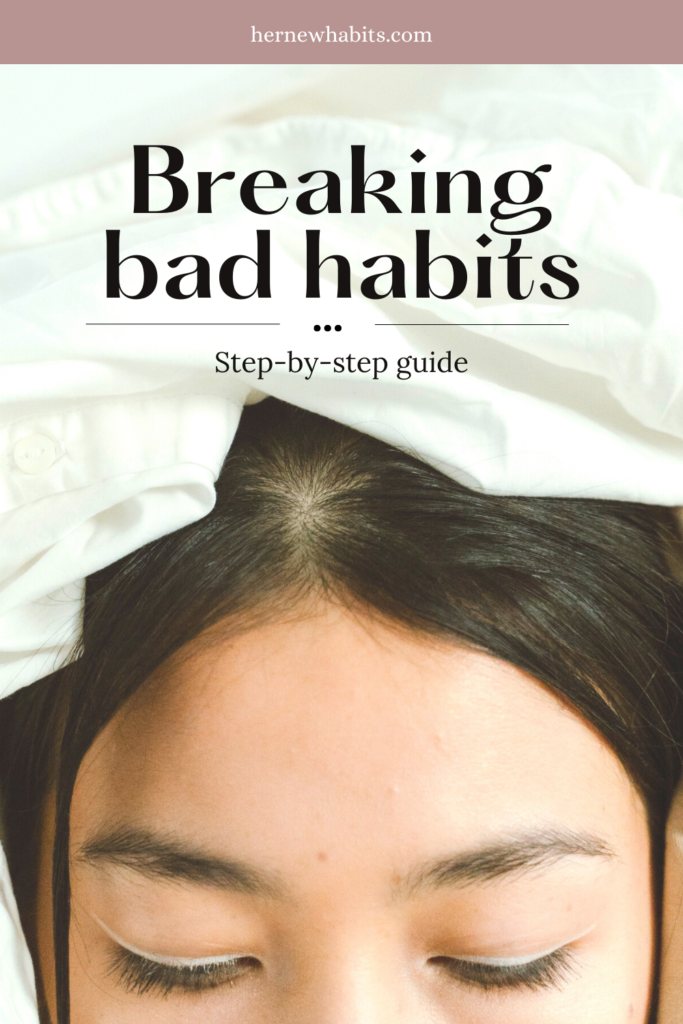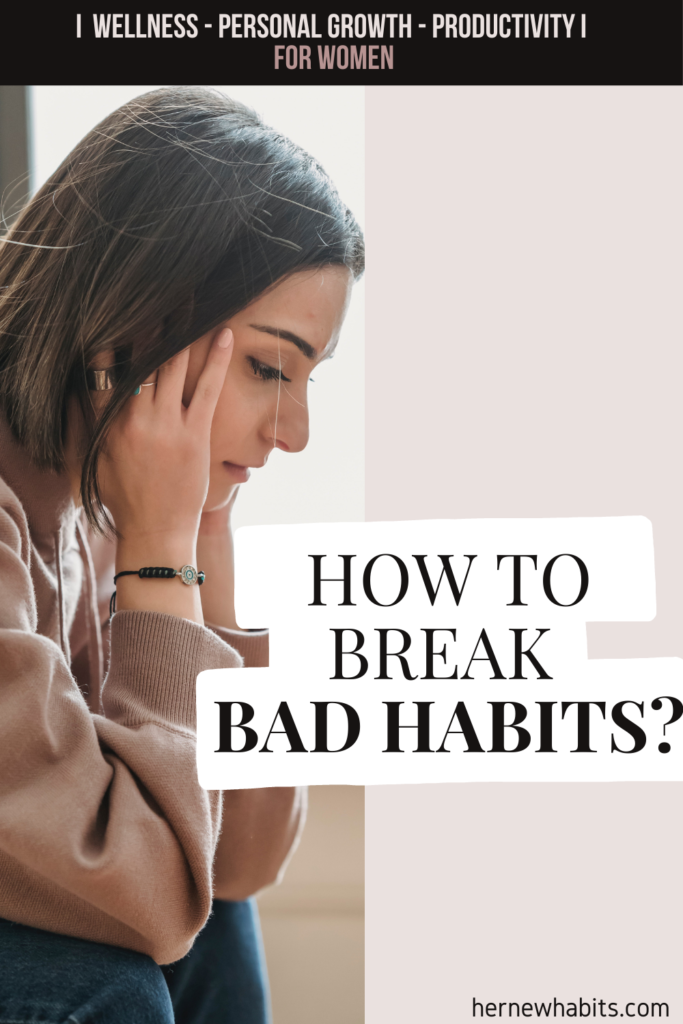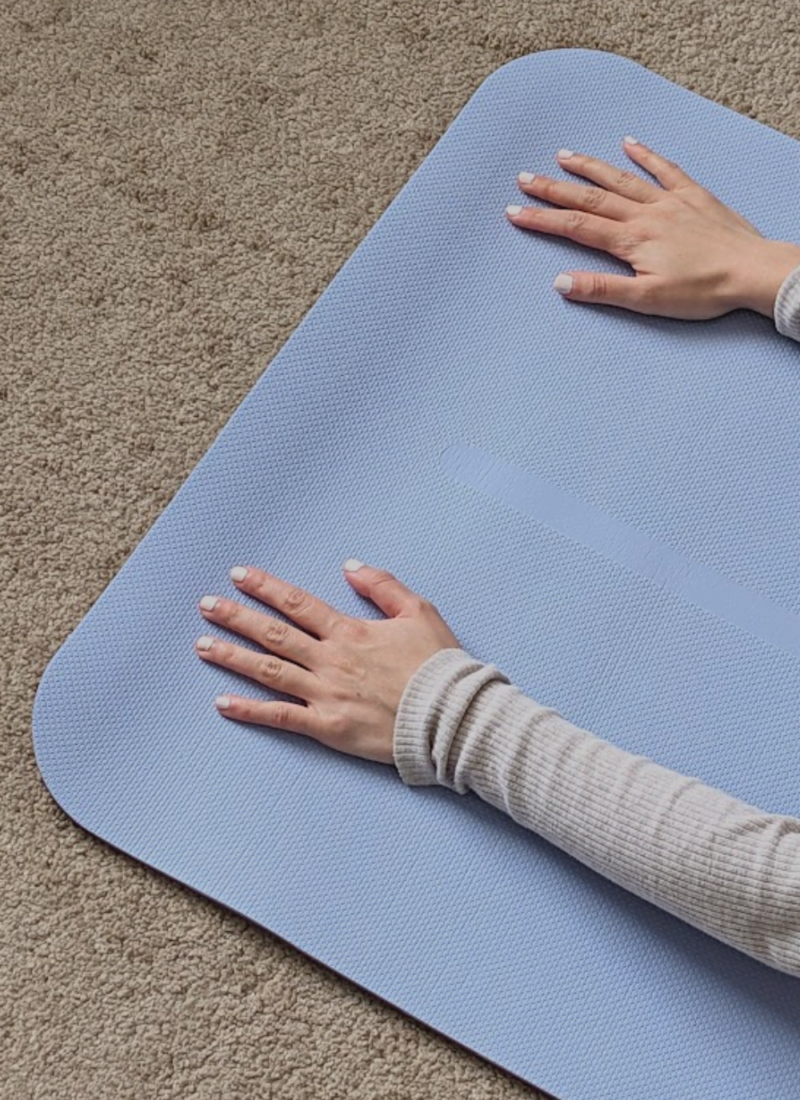Eating a single chocolate chip cookie seems like a very small action with no short-term negative effects. But when you do it every day, the long-term result may not be the best for your well-being,
And deep down you know that!
You often wondered how can I break bad habits for good?
If you are reading this, it is because at some point you have faced the bad consequences of your habits.
Chances are you’ve been feeling that way for a while now, but you’ve decided to ignore it.
You even tried to break those bad habits once, but it most likely didn’t work.
And it didn’t work because you didn’t have the necessary knowledge and strategies to do it.
But the time has come and you are going to be able to change that situation!
In a nutshell, there are two ways to successfully break bad habits:
- Make changes to your actions.
- Make changes to your environment.
It sounds a bit confusing, doesn’t it? No worries!
By the time you finish reading this post, you will have the resources to kick your habits.
For now, you must know that this process requires patience, practice, and repetition, but it is possible.
You can do it!
Now, before you start you need to have a good understanding of how you can create habits.
If you don’t, go to this article: How to build new habits? and once you finish, come back here and continue reading.
I have split this post into two parts:
The first will help you understand why it is so difficult to change your habits.
In the second part, you will learn two ways how to finally break your bad habits.
Let’s dive into it.
Why is it hard for you to break bad habits?

1. You can’t break bad habits because you are not aware of them
Many people are clear about their bad habits, while others have no idea of their existence.
And there is a reason for this.
Have you noticed that bad habits generally do not have negative results in the present?
For example, when people smoke, the cigarette makes them feel good, helps them release stress, or clears their minds.
At that moment, these people are not thinking about the consequences that smoking will bring to their health; they focus on the positive feelings that they have now.
The negative outcomes that would make you aware of a bad habit only appear after years of doing it.
So if you are not aware of the bad consequences of your habit, you may not consider it bad; that will make you think that you do not have to change it.
As Jeffrey Schwartz and Rebecca Gladding wrote in their book:
“you cannot change what you are not aware of, and you cannot make choices about things you do not know exist.”
So. If you want to break bad habits, you must first be aware of them.
There is a very simple, yet effective exercise that will give you a broader look at your habits.
In the next exercise, you will create a baseline of your days.
And that will help you see what you can change to create a better lifestyle.
(Skip it if you already know what habits you want to change)
This is what you can do:
Take a look at your routine and make a list of the things you do the same way every day.
To make this process easier, think of your day in blocks (morning, afternoon, evening) and list each activity.
The following questions, for example, will help you recognize your habits in the morning:
- What do you do as soon as you wake up? What is the first thing you think about when you wake up?
- What time is it when you start using your phone? What is the first thing you do on your phone (social media, e-mails, news)?
- What do you eat for breakfast? What do you drink in the morning?
- Do you do any physical activity?
Use similar questions with the other parts of the day (afternoon and night).
You’ll create a baseline from which you can work.
In the end, you will be surprised at how many behaviors you repeat during a week without realizing it.
Now take the list and identify which of these actions you consider bad habits.
If you can’t find any, ask yourself the following two questions:
- What do you do when you feel sad or bored?
- What do you do when you feel stressed?
Here are some examples of the most common bad habits:
- To bite your nails.
- Being late everywhere.
- Eating too fast.
- Skipping meals.
- Spending long periods of sitting.
- Not washing dishes after every meal.
- To procrastinate.
Now, keep in mind that everyone’s life is different.
So, you are responsible for deciding which habits are good for you and which are not.
For some people, skipping meals can be beneficial, but it may not be a good approach for you.
If you’re still having trouble identifying your bad habits, talk to your partner, a friend, or a family member. They may point out some patterns that they think may be harmful to you or those around you.
2. You can’t break bad habits because you underestimate their power
You must understand that habits (good or bad) are automatic responses. And that you developed them over time through the repetition of certain actions.
When I say “automatic responses” I mean that you don’t think about them while you do them.
For example, some people unconsciously bite their nails when they are stressed or anxious.
One study found that participants did up to 45% of their daily activities without thinking.
That means that during a big part of the day, you could be in autopilot mode.
So, when you do things the same way, your brain uses minimal resources.
That happens because you don’t need as much help to make decisions.
Unfortunately, there is a downside to this:
Even if your action isn’t appropriate or safe for you, you’re going to keep doing it because it’s automatic.
That’s why some people smoke or eat junk food, even though they know how harmful it is to their bodies.
Once you create a habit, it becomes so easy for you that it is almost out of your control.
This is what you can do:
Do you remember the baseline you created in the last section?
Well, use the habits you found and check how many you do without thinking.
Use these questions to reflect on this:
- Which one of these actions has become easier to do?
- How much energy do you spend on them?
- What activities can you do with your eyes closed?
Remember that the more aware you are of your behavior, the easier it will be to change it.
3. You can’t break bad habits beacuse you haven’t identified their triggers
Before a habit becomes an automatic response, it is a simple action that is triggered by something or someone.
For example, the smell of coffee may make you want to buy some.
The smell of coffee is the signal that produces (triggers) a response: buy the cup of coffee.
So, the moment you decide to buy the coffee and you repeat that same action frequently, it becomes a habit.
And that is because your brain associates the coffee shop (trigger) with the action of getting the coffee (response).
You should keep in mind that triggers are different for each person.
Thus, not all of us think about buying coffee every time we smell its aroma.
Many of these triggers go unnoticed, but you need to identify them if you want to break your habits.
To this end, I want to share the following exercise that will help you a lot.
This is what you can do:
Take the list of habits you made in reason 1.
Choose a single habit that you want to break.
Now, think about the specific details that are present when you do it.
Use the following questions to better identify your triggers:
- What time of day is it?
- Who is next to you?
- Is there any sound present?
- Can you smell any smell?
- Where are you? (home, office, park..)
The following example will help you understand this exercise a little more.
Let’s suppose that you picked the bad habit of “check the phone for hours before going to bed”.
After identifying the triggers of the action (check the cell phone), you have realized the following:
Every time you check your phone it’s around 10 pm and only when you’re lying in bed.
In this case, the cues that make you check your phone may be:
- The time of day (10 pm)
- Or, the location (bedroom).
So, your brain knows that it can start an action (check your phone) when it receives a signal from the environment (your bedroom).
Some examples of triggers:
- People
- Time of the day
- Objects around
- Noises
- Smells
4. You can’t break bad habits because you don’t know the real rewards of them
Rewards are the benefits, the problem you solve, or the change you get from your actions.
In the end, those benefits are the reason you stick to your habits (good or bad).
For example, you check your phone when you wake up because that gives you a certain sense of control (reward).
If there were no rewards, the habit would never form, because you would have no reason to repeat the action.
Now, let me ask you this question:
If you don’t get any benefit from what you do, would you do it again?
I think your answer to this question would be “no”.
Therefore, identifying your rewards is key to breaking your bad habits or any habit.
To do this, you first have to know that there are two types of rewards:
- Long-term: Refers to the ones you get after years of doing something.
For example, you can lower your risk of cancer or diabetes by eating whole foods and avoiding processed foods. - Immediate: it is the set of benefits that you usually get at the time you carry out the activity.
For example, people walk because they feel more relaxed and connected to nature.
As I mentioned, bad habits somehow manage to hide the bad consequences that we are having on our bodies.
So, you keep doing something that is not good for you in the long run, because it gives you positive results at the moment.
Those positive results are enough to keep the habit in your routine.
With the following exercise, you will discover more about the rewards of your bad habits.
This is what you can do:
Follow these steps to know what benefits you are getting from your actions.
Take the habit you chose in the last step.
Think about how you feel when you do it. Do you feel relieved, alert, under control?
- What is the change you get by doing it?
- What do you get from that action?
These questions are key to understanding what makes you do what you do.
Do you eat dessert because you are hungry or because you like how it makes you feel?
Do you decide to travel in your car instead of riding a bike because it is safer, less stressful, or more comfortable?
So, make an effort to understand what the real benefits of your habit are. If you do, you will be able to find other actions that can give you the same results.
I will expand on this later in this post.
5. You can’t break bad habits because you don’t have enough strength to start a new one
I’ve seen that the biggest hurdle people face when trying to break bad habits is getting started.
There is a concept known in Chemistry as activation energy.
This refers to the smallest amount of energy that must exist for a chemical reaction to occur.
You can use this notion to change your behavior.
If you want a new habit to happen, you need the energy to start it.
That energy can come from the idea of getting benefits from your behavior (rewards).
If the reward is good enough for you, you will repeat the actions.
Before the bad habit became a habit, it was a response to something or someone in your environment.
When you first started, it was probably harder for you to do it.
Let’s see it in this example:
When you start a new job, you have to learn a lot of new things. And in the beginning, it takes you longer to complete your tasks.
After a month or so, tasks that used to take you hours to complete now take just a few minutes.
Now you feel that you are more productive, although you use less energy than before.
And the same goes for habits. It can be hard at first to get started, but once you get the hang of it, it becomes much easier.
Now, when you give up a bad habit, you will have to replace it with a new one.
If you know the process of creating new habits, you understand that starting is the most difficult part.
How do you make it easier to start the new habit?
This is what you can do:
Think about the new good habit that you want to build; it will be the replacement for the bad habit that you chose before.
Now add the new habit to your routine, including it immediately after the bad habit.
Here are some examples of what it might look like:
- How to drink more water?: after each coffee you drink, drink a cup of water.
- If you want to start exercising: after eating junk food, do 5 jumping jacks.
- How to be more productive?: Every time you sit at your desk, put your phone away and turn off notifications.
Or, set an alarm to remind you to take a break or stretch after completing a task.
That way, the energy you’re already using to do your bad habit is the same you’ll use to start the new one.
6. You are trying to break bad habits that are too big
Since the energy you have is so important, you should know that the smaller the action, the less energy you will need to start it.
For this reason, you must avoid changing habits that are too big.
Instead, try the small ones first because you’ll need less energy to get started and stick with them.
If you’re trying to start going to the gym consistently but can’t stick with it, first try taking the stairs whenever you can, riding a bike, or walking to work or the grocery store.
That way, your body will start to make small changes to your physical activity.
And you will start to see results, and then you can push yourself a little harder and commit to going to the gym.
This is what you can do:
Take the bad habit you decided to change and write it down on a piece of paper.
Now, start thinking about the simplest way you can write this habit.
For example, if you want to be more productive and stop procrastinating (bad habit), break this big habit down into smaller ones.
It would look something like this:
To procrastinate:
- At work
- At school
- On personal projects
Pick one of the areas you want to explore and keep breaking it down into smaller habits.
Let’s say you choose to procrastinate at work, so this is what your habits might look like:
- You leave all the projects for the end.
- You use your work hours to scroll through social media.
- You think too much about every aspect of every one of your tasks.
When you dig deeper, you find simpler actions (now habits) that will be easier for you to work on.
If you need help, you can use the following questions:
- Is this habit affecting more than one aspect of my life?
- Does the habit have more than one simple action?
- Is it easy to identify specific triggers and rewards of this habit?
Let me know in the comments if you need more help with this.
7. You can’t break bad habits beacuse you only rely on intention
Thinking that one day you will break all your bad habits is not enough; you need to take action.
Studies suggest that there is little relationship between intentions and habits.
This means that what you intend to do is not always what you end up doing.
For example, people know that exercise is good for them, yet less than 50% who intend to exercise end up doing it.
Now, the only time your intentions seem to be stronger is when you are exposed to a natural change in your environment.
Changes such as starting a new job, moving to a new house, or welcoming a new member into the family.
In those kinds of moments, your intentions and goals may be stronger than your current habits.
Therefore, you must know how to take advantage of those spaces to start a new habit and break old ones.
In other words, intention can be a powerful tool for starting a new habit; if it’s not strong enough, you shouldn’t trust it.
Instead, try strategies like the ones I’ve mentioned so far in this post.
And little by little you will see how the strength of your habits exceeds the strength of your intentions.
This is what you can do:
In several parts of this post, you can find the heading “This is what you can do”. There I show you specific actions you can take to start breaking bad habits.
Make sure to follow and try each of them with different habits that you want to break.
Also, contact me if you have any more questions.
You can use all the information in this article to take action and start making small changes in your life.
8. You are not waiting enough time for the bad habit to break and the new one to emerge
All over the internet, there are thousands of posts about how to break habits in a week or 30 days. But I want you to know that the actual data says something different.
One study, for example, showed that it can take up to 4 weeks to kick a bad habit.
So, if you don’t commit for that time to sticking with the change, the bad habit could come back.
That period is also important because you are going to form a new habit as a replacement for the old one.
And new habits take up to 66 days to form.
So, if you thought that in a week you were going to be able to break a bad habit, I have to tell you that it is not going to be that easy.
You may have heard this before, but I repeat it because it is key in this process.
Changing habits is possible, but it takes time, patience, and practice.
In the same way, I want to remind you that you are capable of doing it.
That’s why I am sharing all this information with you so that you can be part of this process.
In the next section, you will learn how to break bad habits using two effective ways.
How to break bad habits for good?
(Two effective ways)
So far, you’ve learned the reasons why it’s so hard to break bad habits.
Now it’s time to understand two strategies she can take to successfully break bad habits.

#1 Replace the origin of the reward.
Remember that you can get the same rewards from other actions that you consider better for you.
If you feel alert when you drink coffee, perhaps you can also get the same effect if you go for a walk.
A better way to explain this alternative is through the example of Charles Duhigg.
Duhigg wanted to kick his habit of eating a cookie every day because it was making him gain weight.
First, he tried to avoid cookies altogether, and it didn’t work.
Then he used the habit loop to understand his behavior, and this is what he found:
Trigger: 3:30 in the afternoon.
Answer: Go to the cafeteria to get a cookie.
Reward: Distraction from work
With this exercise, he realized that he was not craving the cookie itself, but rather the distraction from work that resulted from going to the cafeteria.
After some experimentation, he decided to change his response (go to the cafeteria to get the cookie).
The solution for him was to find someone to talk to at 3:30 pm to distract him from work.
This simple action broke his habit of eating a cookie every day, which also helped him stop gaining weight.
Now is your turn to try this and break your bad habits.
This is what you can do:
- Take the rewards you found earlier.
- Think of other actions that can bring you those same benefits.
- Try one and see how it works.
- If it doesn’t work, adjust your action and try again.
You may not be able to change your behavior the first time you try.
That is why it is important to be patient and try different options.
Also, remember that repetition is key to developing the habit.
Tip:
Note that the alternative (new) action has to reward you immediately so that you can fulfill it.
For example, if you want to reduce the time you spend sitting and decide to go for a walk in your neighborhood, but you don’t like walking, you will commit to the first few days, but over time you will stop doing it.
When you change a habit but the new action you’re trying to implement doesn’t bring you immediate rewards, you won’t stick with it.
Immediate rewards refer to the benefits you get while doing the activity, such as enjoyment or entertainment.
As I mentioned before, you stick to habits because of the benefits you get from them.
Here are some examples of immediate rewards:
- Enjoyment
- Entertainment
- Tasty
- Fun
- Interesting
#2 Change the cues in your environment
When changing the source of your reward doesn’t work for you, you can choose to change the environment where you perform your habit.
A lot of the things you do every day are responses to associations you’ve made in the past with people, places, or events.
When one or more of these associations are broken, your body does not perform the habit.
One drawback to this approach is that sometimes people can’t link the cues to their habits, so it can be difficult to change them.
That is why you must be aware of the triggers of your habits.
This is what you can do:
Here you will use the list of triggers you made earlier and identify how you can change one or more simultaneously to break the associations.
For example, if you bite your lip while working on your computer at home in the afternoon, try working from another location.
You can also try working from your tablet or during a different time of day.
Try different options and see what works best for you.
Remember that you will also need repetition to establish the new habit and be patient.
Tip:
There is a time when habit-breaking is most likely to happen: when your environment is changing due to external causes (change of job, moving to another house, etc.)
In this case, people are more likely to think about their actions and create better alternatives.
So, you can use those events that naturally change the signals in your environment to become more aware of your habits and develop good ones.
Before you go
Breaking bad habits is a challenging process that takes up all of your energy at first, but it’s achievable.
Remember that understanding the reasons why it is so difficult to break bad habits will be beneficial during this process.
Also, when you are aware of your habits and everything that goes with it (triggers, responses, and rewards), you will be on the right track to start changing your life.
So, start by identifying the habits you want to change and using one of the two ways I mentioned in this article to do so:
- Find an alternative source for your rewards.
- Change the triggers (signs) in your environment.
You probably won’t be able to try both strategies at the same time, so pick one and give it a try.
If for some reason it doesn’t work, check out the session where I explain why it’s hard to break habits and see if you’re making any of those mistakes.
And if it still doesn’t work, try the other way around.
I assure you, they work!
For myself, I’ve been using these methods to stop procrastinating, overthinking, overeating, cluttering my mind, and more, so I’m sure they’ll help you too.
I recommend that you don’t wait too long to get started, so you can start creating the life you want.
I already know that you are committed to changing his life because you got to this part of the post.
And I am sure that you will apply all the information here to create a better lifestyle.
Share in the comments what bad habits you want to break.
Also, which of the two ways to break them are you going to use first?




Akhila says
Thank you very much! This is an extremely informative and detailed post. Every line is jam-packed with information! Identifying my triggers is something I have always struggled with. I used to find myself engaging in emotionally unhealthy behaviors despite knowing they were bad for me. It was when I sat down to jot down my habits, I realized why I was doing certain things. Jotting down my triggers definitely helped me curb my habits. I can’t wait to try all of the exercises you provided to see whether I’m still carrying any bad habits.
Nury - Her New Habits says
You’re welcome. I’m glad to know that you are working more on being aware of your bad habits because that’s really the key and first step to break them. Thank you, I appreciate your comment.
Thrive with Mariya says
I love your post and the energy you put into it. Bad habits are hard to beat but with hard work, dedication, and a proper environment and support, everything is possible. Thank you for sharing this inspiring article 🙂
Nury - Her New Habits says
Thank you for your comment. I’m happy to know that you like it and I really hope it makes a difference in your life.
Abida says
I have many of these bad habits including biting my nails and sitting around for a long time. I need to get over them. Thanks for the article!
Nury - Her New Habits says
You’re welcome. I hope this post helps you to overcome any bad habits you have and start living a healthier and happier life. Let me know if you have any questions 🙂
Michelle says
Very informative! Lots of stuff I didn’t even realize!
Nury - Her New Habits says
Yeah, lots of things to think about 🙂
Jeannie says
I need to break my habit of eating too fast, I love the tips here they are doable we just have to be mindful to do them.
Nury - Her New Habits says
It is good that you are aware of it, that’s the first step. I’m glad you like the tips and I hope they are useful for you 🙂
Teala says
Great article.
Nury - Her New Habits says
Thank you!!
Adriane says
Great advice. It is so easy to get stuck in habits you need to break.
Nury - Her New Habits says
Yeah, that’s true and that’s is the main reason why I wanted to share this information. I thought it could be useful for many people.
Mehaa says
I love how you’ve broken this down! We all could break our bad habits couldn’t we??
Nury - Her New Habits says
Oh, thanks! Yes, It takes some work, but we all can do it. Thanks for your comment 🙂